From Afghanistan to Iran and the UK, helping fight cancer and educating girls in her homeland - Shakardokht is an inspiration, and now she's telling her life story
and live on Freeview channel 276
And now that she has settled in Portsmouth she is telling her extraordinary life story in her autobiography, Shakar: An Afghan Woman’s Journey.
As well as being an award-winning entrepreneur developing cancer treatments in the UK, Shakardokht is a leading campaigner for girls’ education in her native country. That’s not to mention her family being forced to flee their home in rural Afghanistan when she was just six for Iran. She defied her family over an arranged family not just once but twice, and then much later, also battled her own cancer while pregnant with her third child.
Advertisement
Hide AdAdvertisement
Hide AdCurrently working at Queen Alexandra Hospital in the radiotherapy department as a clinical scientist, Shakardokht is also the CEO and founder of TRUEinvivo, which is based in Surrey Technology Centre in Guilford.


Born in 1977, in Daykundi, Afghanistan, she remembers little of leaving country except saying goodbye to her grandfather before the family headed to Iran – a journey which took six months.
Then at 14 she stood up to her father over an arranged marriage to an older cousin.
“Everything was happening and decisions were made on my behalf, and I was upset, but my father realised that I am upset. So when I went in to the garden, thinking about what was happening, he came out and he said, ‘Well, I am not sure how this marriage is going to work knowing your personality’. I said, ‘I'm not happy with this’.”
Advertisement
Hide AdAdvertisement
Hide AdThey spoke and his words gave her confidence that he would back her choice


“So I wrote a letter, putting my justifications why I'm not happy with this marriage. I started with putting down all my life scope, saying that I have a completely different life scope in my head to what you want me to be – a housewife. You're 12 years older than me and I want to continue my education. There are lots of other girls who would be happy with your proposal and circumstances of life.
“But it's not me.
"You're authorised to force me because of the culture, but please don't do that, otherwise, you will turn your life and my life to a living hell.
"And then I wished him all the best finding another girl,” she laughs.
Advertisement
Hide AdAdvertisement
Hide AdAs Shakardokht admits, it was rare for a father to back his daughter like this. “I think he was sandwiched between respecting his older brother. Thirty years ago, in that culture, the oldest of the family was the decision maker for everyone. On the other hand he wanted me to have a happy life. And he could see this was not the way for me.”
However, the rest of the family cut them off, and then the next year when her father arranged another marriage, Shakardokht again refused. This time, he disowned her.
In 1996 she decided she wanted to go to university.
"It wasn't easy at all. It was a national exam that we had to prepare for. And my father was not talking to me directly, telling my mum, ‘Tell your daughter that the university's really the red line. She has to stop education and get on with life’.”
"I was studying in hiding when everybody was going to sleep. We were refugees, so we had only one room with a little kitchen annexe. At 10pm everybody was asleep and I was sneaking out in the garden. I had a handmade lantern that I was turning on and studying in the corner or going to the bathroom and toilets when it was too cold to stay outside, hoping nobody would need to use them, but I managed to get through!
Advertisement
Hide AdAdvertisement
Hide Ad“I was the only girl from our high school that year that managed to pass the entrance exam. Suddenly I became famous in the town and my situation changed a lot.”
She completed a BSc in radiation technologies at Tabriz University of Medical Sciences
"I was so scared when I went to the university. I stayed in the dormitory, then when I came back to visit home after a couple of weeks, I was very worried. When I rang the bell, my father opened the door and opened his arms and said ‘Hello’ to me. It was such a relief, and then we were best buddies again.”
The Taliban fell shortly after her graduation and Shakardokht decided to return to her home country and work in the capital Kabul.
Advertisement
Hide AdAdvertisement
Hide Ad"I started working as a system professor in Kabul Medical University. It was not easy though, because I had the wrong gender, the wrong religion, wrong ethnicity."
But in recognition of her skills, she was asked to re-establish a cancer facility in Kabul, which meant studying first for higher qualifications in the UK.
She initially came alone to study for her masters in medical physics, while her husband Ibrahim stayed behind with their two daughters Sarah and Zara. But as the Taliban were again on the rise and Shakardokht got an offer of a PhD scholarship at Surrey University, they took the decision that the rest of the family should join her too. Sarah is now 21 and at Glasgow University studying psychology while Zara, 18, recently sat her A-levels.
As the inventor of a method for improving outcomes of radiotherapy on cancer patients, Shakardokht has become one of Britain's leading medical entrepreneurs.
Advertisement
Hide AdAdvertisement
Hide Ad“I did my PhD and found the solution to a problem of lack of information during radiotherapy cancer treatment. After finishing my PhD I was scratching my head and said: ‘Look, you found a solution. It's in scientific papers, but it is not solving a real problem because it's not a product in the market’.”
So she started her own company.
“Things were going well, I got a Women in Innovation Award and the whole team had formed. But as we were on the peak of performance, I discovered a lump in my breast.
“I went to the GP and during the initial examinations I was filling the form for an MRI. The last question was: Are you pregnant? I said, ‘I don't think so, but I'm a couple of days late’. They said to go and do the test. I couldn't believe the result. I thought it was a joke. I booked a termination because I didn't think that a baby could survive the chemotherapy, but when I met with another surgeon during an emergency appointment she said: ‘Didn't you want this baby?’ I said that we did but didn’t think he or she could survive the cancer treatment.
“She told me that you can change your treatment plan. Instead of starting with chemo, we can start with surgery. Then when you pass the first trimester, we can do chemotherapy. Then we can induce the baby and you can have your radiation treatment.”
Advertisement
Hide AdAdvertisement
Hide AdSani was induced at 37 weeks, and “now he's such a healthy, energetic four year old boy!”
Shakardokht had, unsurprisingly, found it difficult to be on the other side of the divide as a patient during this time.
"Sometimes it's difficult when you know too much, you always want the latest treatment possible from looking at the literature and science. But the reality of how much of it is implemented in the hospitals is heartbreaking sometimes. For example, I wanted to use my own discovery of using radiation detectors during my treatment, but I didn't have approval at the time – I couldn't do it. The detectors just needed UKCA approval, which we have now, but we didn't have it then.”
As one of six siblings scattered across five countries, it is clear that Shakardokht wants to help her homeland. One such way is through the charity Education Bridge for Afghanistan which she is chairwoman of.
Advertisement
Hide AdAdvertisement
Hide Ad“Some of my colleagues and friends in the Afghan diaspora, in various countries, they came to me and said: ‘Now that the schools are shut, how can we help?’ So we looked into possible ways of helping girls and online education was the first thing that came to our minds. We started with forming an online platform to give not only the curricular education, but also extra-curricular, personal developmental lessons, especially aiming for opening doors to other opportunities around the world, to tell them not to think you're locked within the geography of Afghanistan – there are plenty of other opportunities there if you have the capacity and the knowledge to use it.
“That's the aim, and that's why the charity is called Education Bridge for Afghanistan. We want to act as a bridge, but it's not easy. Everybody in the charity is working voluntarily and colleagues in Afghanistan who are implementing the education are volunteer people, and the economic situation is not great.”
It is also dangerous work for those in Afghanistan. “They are taking the risk because it matters to them,” Shakardokht adds.
When it came to telling her own story, Shakardokht says that people had often asked her when she would write an autobiography – particularly after hearing her inspirational story as a keynote speaker at various conferences. There was a version in Persian she started with a former teacher, but that stalled.
Advertisement
Hide AdAdvertisement
Hide Ad”In the back of my mind, at the point when Afghanistan fell off, I saw lots of disappointment in women and girls, and I was trying to attend the webinars to give them some hope by telling them my personal story about how many hurdles there were until I reached this point, and it was resonating with them. So I thought: ‘I think I can do this’. Whenever they are reading, they can see that you're at the middle of dark times, but it's not going to last forever. A major motivation was giving hope to girls.”
Shakar: An Afghan Woman’s Journey is available now from all good booksellers.